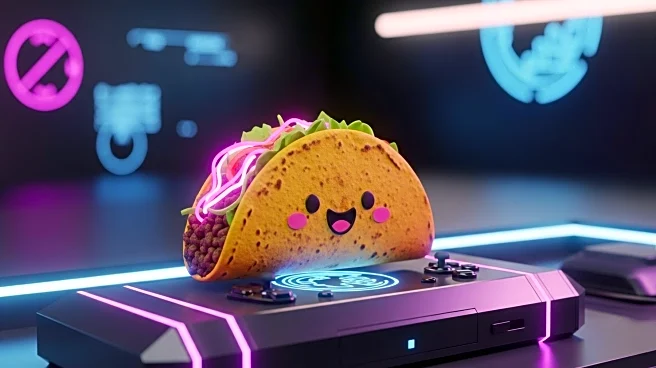What's Happening?
Roblox has introduced a new feature in its game 'Steal a Brainrot' called Capi Taco. This feature is part of the Taco Tuesday event within the game. Capi Taco is a rare item classified as a 'Brainrot God' and is priced at $31 million in the game. To obtain Capi Taco, players must collectively feed 15 Taco Brainrots to a character named Sammy, located near the Robux Shop. Once this requirement is met, Capi Taco will appear on the conveyor belt, allowing players to claim it. This event encourages collaboration among players as they work together to meet the conditions necessary for Capi Taco to spawn.
Why It's Important?
The introduction of Capi Taco in Roblox's 'Steal a Brainrot' highlights the game's strategy to engage players through collaborative events. By requiring a collective effort to unlock rare items, Roblox fosters a sense of community and teamwork among its users. This approach not only enhances player interaction but also increases the game's replayability and user retention. The high in-game cost of Capi Taco also reflects the game's economic dynamics, where players must strategize and possibly invest significant time or resources to acquire rare items. This can lead to increased in-game purchases, benefiting Roblox Corporation financially.
What's Next?
As players engage with the Taco Tuesday event, it is likely that Roblox will continue to introduce similar collaborative events to maintain player interest and engagement. The success of Capi Taco could lead to the development of more rare items and events that require collective player action. Additionally, player feedback on this event may influence future updates and features in 'Steal a Brainrot' and other Roblox games. The company may also explore expanding this model to other games within its platform to replicate the engagement success.
Beyond the Headlines
The collaborative nature of the Capi Taco event in Roblox reflects broader trends in online gaming, where community-driven content and events are becoming increasingly popular. This approach not only enhances the gaming experience but also builds a loyal player base. Furthermore, such events can serve as a testing ground for new game mechanics and economic models within the gaming industry, potentially influencing future game development strategies.









